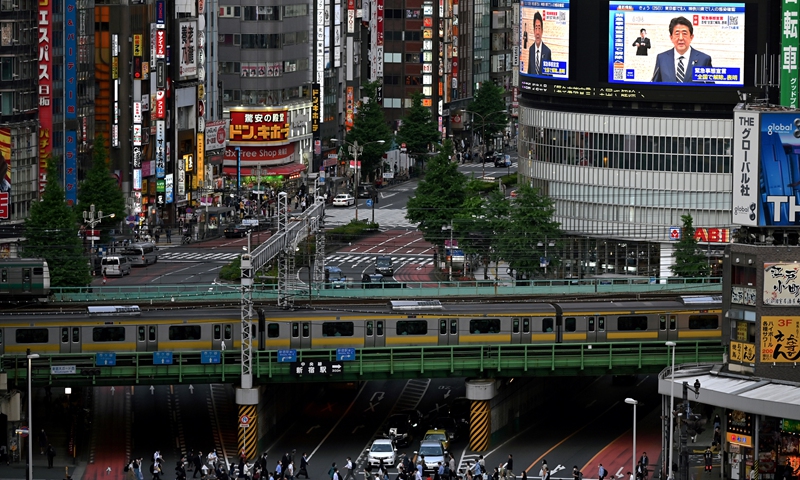Japan should not stand with US like Australia: experts
By GT staff reporters Source:Global Times Published: 2020/5/28 22:05:36

Japanese Prime Minister Shinzo Abe (top right) is seen on a live TV broadcast in Tokyo’s Shinjuku. He lifted the state of emergency imposed nationally to combat the coronavirus following a sharp decline in the number of new cases. Photo: AFP
If Japan wants to maintain sound economic and trade relations with China, it better not stand with and fawn on the US as Australia did amid escalating China-US diplomatic and trade tensions, Chinese experts warned.
The Japanese government should not follow the US, like Australia has done, if the Asian country still wants to reap the dividends of the Chinese market, Bai Ming, a research fellow at the Chinese Academy of International Trade and Economic Cooperation, told the Global Times.
The comment came after a rare statement by Japan issued soon after China's top legislature voted on Thursday to adopt a draft decision on establishing and improving the legal system and enforcement mechanisms for the Hong Kong Special Administrative Region (HKSAR) to safeguard national security.
Japan is "seriously concerned" about the decision made by China's National People's Congress regarding policies toward Hong Kong, and recognized Hong Kong as an "extremely important partner for Japan" with economic ties and people-to-people exchanges, said a statement by the Ministry of Foreign Affairs of Japan.
"It is very inappropriate for Japan to make such comments when a group of Western countries led by the US hyped the Hong Kong affair viciously in order to destroy China's development," Gao Hong, an expert at the Institute of Japanese Studies under the Chinese Academy of Social Sciences (CASS), told the Global Times on Thursday.
"Even if Japan wants to win recognition from the US in a hurry by making comments that harm China-Japan relations, it will not receive any praise from its US boss," Gao added.
Japan should to have a clear mind when considering the bilateral relationship as Japan's prospective development relies on regional economic cooperation in Asia and the Chinese market, said Gao.
In April, Japan appropriated $2.2 billion to help its manufacturers shift production out of China, as it sought to reduce dependence on Chinese supply chains. Bai noted that this is exactly what the US is trying to do.
"If Japan wants to establish a green channel with China, first of all, don't follow the US," he added.
Learning that there is a "fast track" entry system between China and South Korea, Takehiko Saeki, chief representative of the Japan External Trade Organization's (JETRO) Wuhan office told the Global Times that Japanese companies in China very much hope that a similar channel could be opened between China and Japan to facilitate the heads of Japanese companies returning to China.
According to a document posted online, the Civil Aviation Administration of China (CAAC) will temporarily adjust its policy and give "green channels" to chartered flights. Eight countries - Japan, South Korea, Singapore, the UK, Germany, France, Italy and Switzerland - are on the list.
On Wednesday afternoon, two chartered flights took off from Japan's Kansai International Airport bound for Wuhan Tianhe Airport. On the flight were 136 Japanese nationals returning to their work positions in China, many from Nissan Motor and Honda Motor, media reports said.
However, due to the lack of a China-Japan fast-track entry system like the one between China and South Korea, which enables travelers' 14-day COVID-19 quarantines to be shortened to one or two days, the Japanese employees have to be quarantined for 14 days upon arrival in China.
It is notable that exchanges between Chinese and South Korean top officials are much more frequent than those between Chinese and Japanese officials, Gao said, suggesting Japanese politicians should have clear minds when considering bilateral relations.
China is willing to open "fast track" entry systems with more countries in addition to South Korea in order to promote production recovery, but these countries should reciprocate in kind and not let politics get in the way of bilateral economic exchanges, experts said.
Posted in: ECONOMY